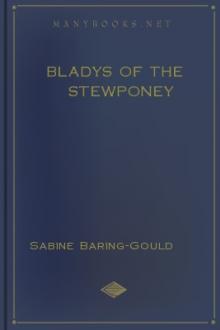The Broom-Squire - Sabine Baring-Gould (life books to read .txt) 📗

- Author: Sabine Baring-Gould
Book online «The Broom-Squire - Sabine Baring-Gould (life books to read .txt) 📗». Author Sabine Baring-Gould
Iver endured this, not entering with interest and pleasure into the work of the farm. He had no perception of the points of a bullock, and he had a prejudice in favor of ragged hedges.
Iver's neglect of duties, and forgetfulness of what was told him, called forth reprimand and provoked chastisement. They were not due to wilfulness or frivolity, but to preoccupation of the mind. The boy had no natural taste for the labors of the field. He disliked them; for everything else he had eyes, save for that which pertained to the tasks imposed on him.
Throughout early boyhood this lack of interest and inattention had caused much friction, and this friction became aggravated as he grew older, and his natural bent became more marked.
It would be hard to find in one family two persons so utterly dissimilar as Iver and his father. They seemed to have diverse faculties seated in their several organs. They neither saw, heard, nor smelt in the same manner, or rather saw, heard, and smelt so differently as to feel in distinct fashion. What pleased the one was distasteful to the other.
It was not possible for Iver to open his mind to his father, because his father could not understand and appreciate his thoughts.
But if his heart was sealed to Simon Verstage, it was open to his mother, who loved and spoiled him, and took his part invariably, whether the boy were in the right or wrong. In every way possible she humored his fancies; and she, unwisely, condoled with him on what she was pleased to consider as his father's injustice. At length there ensued a rupture so wide, so aggravated by mutual recrimination, that Mrs. Verstage doubted her ability to bridge it over.
This breach was occasioned by Iver one morning climbing to the sign-board and repainting the stern of the vessel, which had long irritated his eye because, whereas the ship was represented sideways, the stern was painted without any attempt at fore-shortening; in fact, full front, if such a term can be applied to a stern.
The laws of perspective were outraged in the original painting; of such laws Iver knew nothing. What he did know was that the picture was wrong. His eye, his natural instinct told him so. The matter had been for long one of controversy between himself and his father. The latter had been unable to understand that if the portholes at the side were visible, the entire stern could not possibly be viewed in full.
"She's got a stern, ain't she?" asked the old man. "If she has, then wot's we to deny it her?"
At length Iver cut the controversy short, and brought the quarrel to a crisis by climbing a ladder with a brush and some paints obtained from the village carpenter, during the temporary absence of his father, and putting the foreshortening to rights to the best of his ability.
When the old man was aware what his son had done on his return from Godalming, whither he had betaken himself to a fair, then he was furious. He stormed at Iver for daring to disfigure the sign-board, and at his wife for suffering him to do it unreproved.
Iver turned stubborn and sulky. He muttered an answer, lacking in that respect due to a parent. The old man became abusive.
Mrs. Verstage intervened ineffectually; and when night arrived the youth made a bundle of his clothes and left the house, with the resolve not to return to it so long as his father lived.
Whither he had gone, for a long time was unknown. His mother wept, so did Mehetabel. The old man put on an assumption of indifference, was short and ungracious to his wife. He was constrained to engage a man to do the farm work hitherto imposed upon Iver, and this further tended to embitter him against his rebellious son. He resented having to expend money when for so long he had enjoyed the work of Iver free of cost.
The boy's pride prevented him from writing home till he had secured himself a position in which he could maintain himself. When he did communicate with Thursley, it was through Mehetabel, because Simon had forbidden any allusion to the truant boy, and Mrs. Verstage was not herself much of a scholar, and did not desire unnecessarily to anger her husband by having letters in his handwriting come to her by the post.
Years passed, during which the landlady's heart ached for her son: and as she might not speak of him to Simon, she made a confidant of Mehetabel.
Thus, the old woman and the girl were drawn closer together, and Mehetabel glowed with the thought that she was loved by the hostess as though she were her own daughter.
To talk about the absent one was the great solace of Susanna Verstage's life. There ever gnawed at her heart the worm of bereavement from the child in whom her best affections, her highest pride, her sole ambitions were placed. It may be questioned whether, without the sympathetic ear and heart of Mehetabel into which to pour her troubles and to which to confide her hopes, the woman would not have deteriorated into a hard-hearted virago.
Her love to Simon, never very hot, had dried up. He had wounded her to the quick in unpardonable fashion in driving her only child out of the house, and all for the sake of a two-penny-ha'penny signboard.
Throughout her work she schemed, she thought for Iver; she toiled and endured in the tavern only to amass a competence for him. She clung to the place only because she trusted some day he would return to it, and because every corner was sweet with recollections of him.
When not at work she dreamed, waking or sleeping, and all her dreams were of him. She built castles in the air--all occupied by him. She had but one hope: to meet her son again. All her activities, all her thoughts, all her aspirations, all her prayers were so many lines focussing on one point, and that her son. To Mehetabel she told her mind, and Mehetabel shared all her hopes; the heart of the girl beat in entire sympathy with that of the hostess. Iver's letters were read and re-read, commented on, and a thousand things read into them by the love of the mother that were not, and could not be there. These letters were ever in the girl's bosom, kept there to be out of reach of old Simon, and to be accessible at all moments to the hungering mother. They heard that Iver had taken to painting, and that he was progressing in his profession; that he gave lessons and sold pictures.
What musings this gave rise to! what imaginations! What expectations!
Mrs. Verstage never wearied of talking of Iver to Mehetabel, and it never wearied the girl to speak with the mother about him.
The girl felt that she was indispensable to the old woman; but that she was only indispensable to her so long as Iver was away never entered into her imagination.
There is a love that is selfish as well as a love that is wholly self-annihilating, and an inexperienced child is incapable of distinguishing one from the other.
There is false perspective in the human heart as well as upon signboards.
CHAPTER VIII.
ONLY A CHARITY GIRL.
Simon Verstage sat outside the door of his house, one hot June evening, smoking his pipe.
By his side sat his wife, the hostess of the Ship. Eighteen years have passed since we saw her last, and in these years she has become more plump, a little more set in features, and mottled in complexion, but hardly otherwise older in appearance.
She was one of those women who wear well, till a sickness or a piercing sorrow breaks them down, and then they descend life's ladder with a drop, and not by easy graduation.
Yet Mrs. Verstage had not been devoid of trouble, for the loss of her son, the very apple of her eye, had left an ache in her heart that would have been unendurable, were not the balm of hope dropped into the wound. Mehetabel, or as she was usually called Matabel, had relieved her of the most onerous part of her avocation. Moreover, she was not a woman to fret herself to fiddle-strings; she was resolute and patient. She had formed a determination to have her son home again, even if she had to wait for that till his father was put under ground. She was several years younger than Simon, and in the order of nature might calculate on enjoyment of her widowhood.
Simon and his wife sat in the wide porch. This had been constructed as an accommodation for wayfarers, as an invitation to take shade and shelter in hot weather or Mustering storm; but it also served what was uncontemplated, as an ear to the house. Whatever was uttered there was audible within--a fact very generally forgotten or unsuspected by such as occupied the porch. And, indeed, on the present occasion, this fact was wholly unconsidered by the taverner and his spouse, either because it escaped their minds that the porch was endowed with this peculiarity, or else because the only person then in the house was Mehetabel, and her hearing or not hearing what was said was an indifferent matter.
Had there been customers present, drinking, the two would not have been together when and where they were, nor would the topic of conversation between them have been of a private nature.
The innkeeper had begun with a remark which all the world might hear, and none would controvert, viz., that it was fine hay-making weather, and that next day he purposed carrying the crop.
But Mrs. Verstage was indisposed to discuss a matter so obvious as the weather, and so certain as that it would be utilized for saving the hay. She plunged at once into that which lay near her heart, and said, "Simon, you'll answer that there letter now?"
"Whose? Iver's?"
"Of course, Iver's letter. Now you yourself have heard from him, and what does that mean but he wants all square between you. He has got into a famous business. He sells his pictures and gives lessons in drawing and painting at Guildford. It's but a matter of time and he will be a great man."
"What! as a drawing master? I'd as lief he played the fiddle and taught dancing."
"How can you say that, Simon?"
"Because it is what I feels. Here he had a good farm, a good inn, and a good business--one that don't dwindle but is on the increase, and the land bettering every day--and yet off he went, chucked aside the blessin's of Providence, to take up wi' scribblin' and scrawlin' on paper. If it weren't a thing altogether shameful it would be clear ridic'lous."
Simon sucked in smoke enough to fill his lungs, and then blew it forth leisurely in a long spiral.
"Odds' life," said he, "I don't see why I shu'd concern myself about the hay, nor anythin' else. I've enough to live upon and to enjye myself. What more do I want now?"
"What more?" inquired the landlady, with a sigh and a catch in





Comments (0)